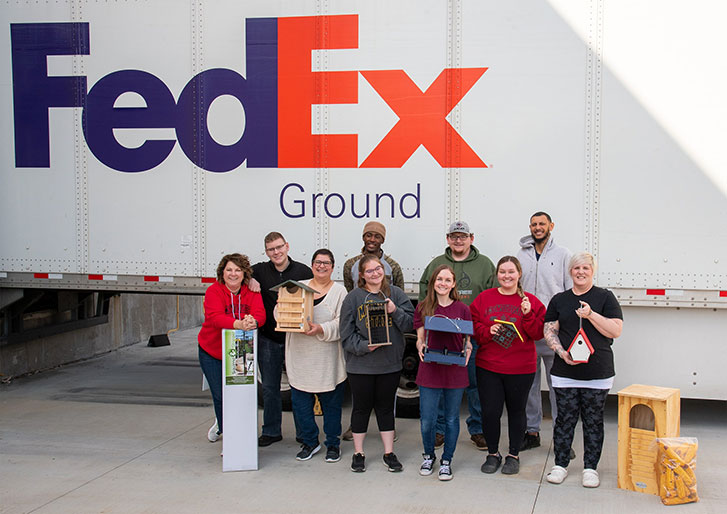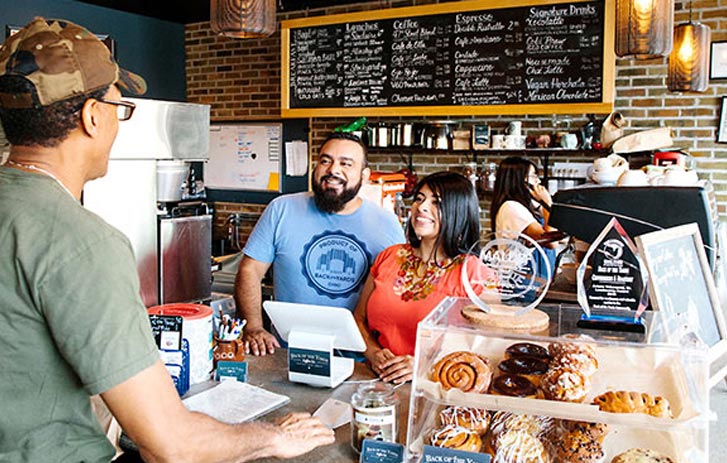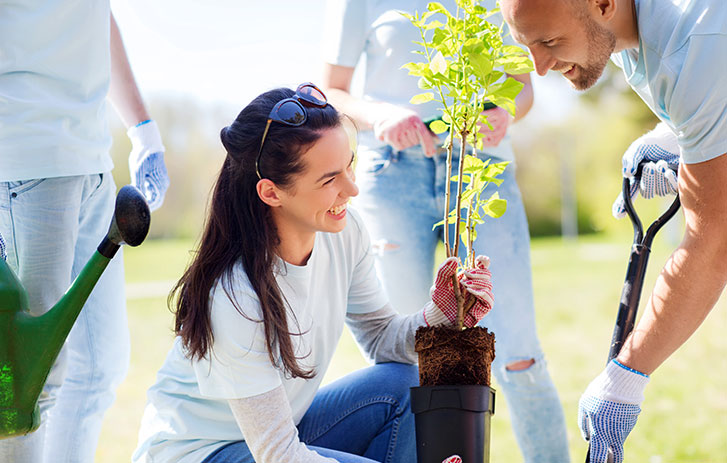Small businesses working toward a more sustainable future
According to Conservation International, as of May 2020 the concentration of carbon dioxide in our atmosphere is the highest it has been in human history, and 800 million people (11% of the world’s population) are vulnerable to climate change impacts like droughts, floods, heat waves, extreme weather events, and sea-level rise. Not surprisingly, climate change also affects small businesses in many ways—lost productivity and forced closures due to extreme weather, higher cooling costs, the need for disaster insurance or building upgrades, and more. We checked in with some of the winners of the 2021 FedEx Small Business Grant program to learn how they’re finding new and innovative ways to make their respective industries more sustainable in the midst of the fight against climate change.
“We love nature and the beauty of nature, and if we can help reduce what’s going into landfills, maintain the environment, and reduce pollution, then that’s what we want to do.”
Birds of a feather recycle together
JCs Wildlife is a small family-owned online retailer that specializes in products for bird and nature enthusiasts. What is now a successful online shop for bird-related products with a team of 40 employees started as a hobby for owner Christopher Briggs. An avid builder, he began making bird feeders to sell on eBay. Sales took off, and after a few years of success, Christopher and his wife Jennifer decided to make the leap and create a business. “It was scary,” says Jennifer Briggs, “but this calm just came over us and we were like, no, this is the time to do it. And we haven’t looked back since.”



For the Briggses, sustainability was important from the start. “We love nature and the beauty of nature, and if we can help reduce what’s going into landfills, maintain the environment, and reduce pollution, then that’s what we want to do,” says Jennifer. They’ve teamed up with a local distribution warehouse to recycle their leftovers for use as packaging material, reducing the amount of waste that goes into the landfill. They reuse cardboard for packaging as well, upcycling it into reusable shipping materials to safely transport their products.
.jpg)
.jpg)
.jpg)
Being sustainable also translated into the product they were building. JCs Wildlife uses an eco-friendly recycled material called Poly Lumber in their birdhouses and feeders. Poly Lumber, which is lumber-type planks made from recycled milk jugs, is fade- and weather-resistant, and JCs Wildlife even saves the scraps from their shop to get recycled into new material. “Poly Lumber always looks really good,” says Jennifer, “so five years from now you’re not going to throw the birdhouse away because it looks bad, so it won’t be going into a landfill.”
For JCs Wildlife, building a long-lasting sustainable product for their customers to enjoy and that their employees can be proud of is important. “We’re always looking positively towards the future, thinking how we can do better, how we can create a great customer experience, and how we can provide a great environment for our employees,” says Jennifer. Plans to expand to a brick-and-mortar store are in motion, allowing customers in the community to shop locally, and furthering JCs Wildlife’s positive and sustainable impact on animals and humans alike.
Taking sustainability to new heights
Mark Reed co-founded Prism Kites in 1992 with a childhood friend in Seattle. What started in a basement with a few maxed-out credit cards, a sewing machine, and an idea has turned into a well-known, respected kite-making firm.
Prism Kites built its business on sport and maneuverable kites but has branched out and also makes traditional single-line kites, power kites, and more. Mark, who has a background in design and architecture, has built things his entire life. “I’ve always been fascinated by wind and weather, and anything to do with fluids and light,” he says. After college, where he got hooked on flying a maneuverable sport kite, he was inspired to create something that reflected the technology he saw in windsurfing, hang-gliding, and sailing. “I just thought, gosh, these kites could be so much cooler,” he says. And so Prism Kites was born.



In terms of sustainability, Prism Kite’s longevity makes them soar. “Unlike many kites, which are treated as disposable toys, we make our products built to last,” says Mark. “Our kites can’t be recycled, so we keep them flying.”
This means designing products that can last and making sure the company can support the products through their lifetime. Prism Kites keeps a full inventory of spare parts on their retail site, so customers with broken parts can replace them and get their kites back in the air in no time. “We hear from customers literally every day of the week who are flying kites that are more than 20 years old,” says Mark.



Prism’s packaging for the kites also promotes a full lifetime of use. Their kites are packaged and sold in a travel case designed to hold the kite for as long as it’s used. There’s no additional packaging that needs to be thrown away, with the possible exception of a small recyclable hang tag. “We put as much work into the packaging as do into the kites,” says Mark.
Overall, for Mark the payoff has been in seeing something that started decades ago in a basement in Seattle grow into something so big. “It’s been a lot of fun,” he says. “And I feel incredibly fortunate to have kind of stumbled into all this over the years.”
Growing a greener future is a family affair
For Harmony Harvest Farm, sustainability has always been a part of the mission. Owned and operated by sisters Jessica Hall and Stephanie Auville and mom Chris Auville, the 20-acre flower farm located in Virginia’s Shenandoah Valley sells 100% American-grown flowers to customers across the country.
“The American-grown flower movement is a sustainable, holistic movement in and of itself,” says Stephanie. With over 80% of flowers sold in the U.S. imported from other countries, Harmony Harvest Farm grows and sells their flowers on U.S. soil, filling the need for local floral.
“We really, really focus on sustainability on both fronts of our business,” says Jessica. “From looking at wholesale and helping florists find more sustainable methods of getting flowers, to retail and talking through recyclable options with our boxes.”






“The American-grown flower movement is a sustainable, holistic movement in and of itself,” says Stephanie. With over 80% of flowers sold in the U.S. imported from other countries, Harmony Harvest Farm grows and sells their flowers on U.S. soil, filling the need for local floral.
“We really, really focus on sustainability on both fronts of our business,” says Jessica. “From looking at wholesale and helping florists find more sustainable methods of getting flowers, to retail and talking through recyclable options with our boxes.”
Harmony Harvest also encourages consumers to look in their own communities for sustainable flower options. “Look and see if there are flowers close to you, if there are small growers close to you,” says Jessica. Proving that sometimes the best and most eco-friendly option can literally be in your own backyard.
Working together for a brighter tomorrow
As these businesses have shown, prioritizing sustainability means more than just empty statements about going green. Bold, innovative solutions today can help create a better tomorrow. And businesses both large and small can have a huge impact on reducing waste and CO2 emissions.
Consumers are on board—65% of shoppers say they want to buy from brands that advocate for sustainability, and over half of U.S. consumers are very concerned about the environmental impact of packaging.
At FedEx, we’re working our way toward delivering a more sustainable future with a goal of carbon neutral operations by 2040. And to reduce waste, we offer free packaging options for FedEx Express® shipments that are reusable, recyclable, and made from recycled content. So whether you’re looking for fresh-cut American-grown flowers, a new bird feeder for your front yard, a kite that will take flight year after year, or simply a shipping solution, be sure you’re doing good for your planet.
Related reading

10 tips for creating a sustainable business
Kat Crabill, founder of Nurdle in the Rough, talks sustainability and getting your employees and customers to invest in your green values.
read article
How small businesses give back
For some entrepreneurs, doing good and giving back is more than a seasonal theme, it’s a part of their business culture all year.
read article
Sustainable marketing examples to inspire your business
Sustainability is essential for your company’s success. These examples could help your business reduce waste and increase brand awareness.
read article